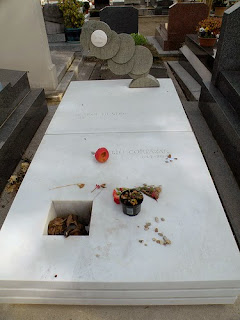Translated, with permission, from Tororo's French original at A Nice Slice of Tororo Shiru.
The year 2014 has been decreed the año Cortázar by the relevant authorities.
For the duration of the año Cortázar, the cronopios have deposited receptacles intended to receive contributions towards the financing of the festivities on windowsills, on loose planks at construction sites, on shelves in telephone booths (where these still exist), and in various other locations reasonably well-sheltered from rain (preferably, but not always, because after all one can't think of everything).
These receptacles consist of china tea cups, faux-bronze key trays inherited from grandparents, colored advertising mugs given away by various catering companies, plastic toothbrush-cups, ashtrays recently discarded by the bistros that once utilized them, and aluminum pie-tins; you will easily recognize them, in spite of their variety, because the cronopios, with admirable foresight, have deemed that it would be a shame if these objects served absolutely no purpose until they had been completely filled with money — something which, they are aware, will require the passage of a certain amount of time — and have thus garnished the bottoms of the receptacles with bird seed.
Locate the ones in your neighborhood, and wait before depositing your offering until the birds have eaten all the seed, because it would be a shame if your bills, softened by long circulation, were to be diverted from their fiduciary purpose in order to line the nest of swallows, or that your shiny coins should end up decorating the abodes of magpies.
During the same period, the famas have announced through official channels that in honor of Julio Cortázar they will dance respite on even-numbered days from 4:30 to 5:00 in the afternoon, and that they will dance catalan on odd-numbered days from 5:00 to 5:30.
Green and humid, a cronopio poses on a slab...
... on which someone has carved "Julio Cortázar," somewhere in the cemetery of Montparnasse.
Once there, not really knowing what to do, he smiles with a slightly embarrassed air.
✵
Translator's note: I have borrowed the names of the dances (which are tregua, catala, and espera in the original Spanish) from Paul Blackburn's translation of Cronopios and Famas. Blackburn had apparently worked up a hypothesis, based on the similarity between catala and catalán, to explain the three-fold division of cronopios, famas, and esperanzas along ethnic lines. Below is Cortázar's response, from a letter dated March 27, 1959 that was written in a mix of Spanish (which I've translated) and English. The passages in brackets are missing words restored by the editors of Cortázar's letters:
Let me explain: to dance tregua and dance catala can't be [translated as] "to dance truce and dance catalan," because I never thought that tregua and [catala] had that meaning. For me it's simply a phrase with a certain magic of [rhyme], a sort of "runic rhyme" in Poe's sense. To begin with, catala doesn't [mean] Catalan. Of course now that I've read your division between [Spanish], Catalan, and Madrid businessmen, I wonder if you're not right. Who is right, [the Agent] or the Author? No use to scan the contract. No explanatory clause provided. But, Paul, if Cortázar's Famas dance catalan, is that fundamentally wrong? The Author SAYS, no. Famas may dance catalan and dance truce. Let them dance. I think your philological enquiry is delightful and quite true in the poetic sense of Truth, which is the ONLY sense of Truth. (I am speaking like Shelley, I'm afraid.)In the end, Blackburn's published translation replaced "truce" with the much funnier "respite," but arguably the terms should be left untranslated so that the cronopios, famas, and esperanzas may freely dance tregua, catala, and espera as the spirit moves them. — CK






No comments:
Post a Comment